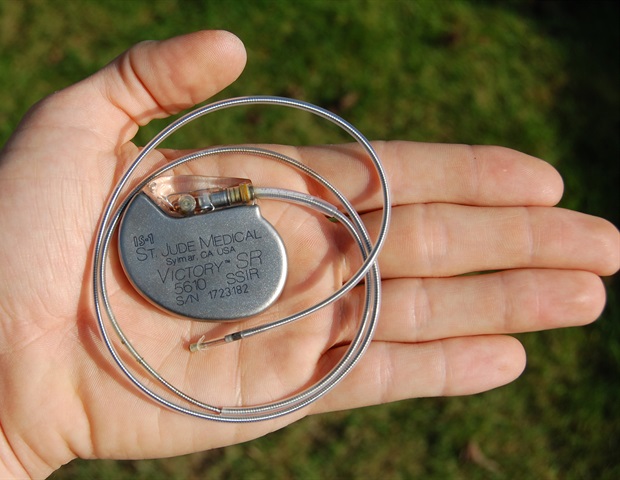
A randomized trial that in contrast beforehand used and new pacemakers in sufferers discovered the reconditioned gadgets had been as secure and efficient as new pacemakers, probably providing inexpensive choices for sufferers in low-and middle-income nations. This was the discovering of late-breaking science offered as we speak on the American Coronary heart Affiliation’s Scientific Periods 2024. The assembly, Nov. 16-18, 2024, in Chicago, is a premier international trade of the most recent scientific developments, analysis and evidence-based medical follow updates in cardiovascular science.
Reusing pacemakers is prohibited within the U.S. Nevertheless, the U.S. Meals & Drug Administration permits re-sterilized gadgets to be exported for reuse. Pacemakers had been recovered from deceased sufferers and sufferers present process surgical procedures that required the elimination of their current gadgets. Pacemakers with at the very least six years of battery life and correct electrical operate had been sterilized for reuse.
The “My Coronary heart Your Coronary heart” (MHYH) research in contrast the operate of refurbished pacemakers to new gadgets in a randomized trial of practically 300 adults in seven nations.
Entry to pacemakers is proscribed in lots of low- and middle-income nations because of the comparatively excessive value of the gadgets. In some high-income nations, as many as 1,000 individuals per million inhabitants could obtain a pacemaker yearly. In low-income nations, it may very well be 3 per million inhabitants or fewer who get pacemakers every year.”
Thomas Crawford, M.D., lead research creator, professor of inside drugs within the division of heart problems, College of Michigan Medical Faculty in Ann Arbor, Michigan
Earlier analysis has advised that refurbished pacemakers may very well be safely implanted. Nevertheless, these research had been retrospective, noting tendencies from beforehand collected data. That is the primary potential, randomized research that included affected person outcomes associated to operate and an infection with reconditioned gadgets, with follow-up data collected as much as 90 days after implantation.
“With reconditioned pacemakers, there’s fear about whether or not the machine will trigger an infection and whether or not it would operate correctly,” Crawford stated. “The 90-day endpoint of the My Coronary heart Your Coronary heart research addresses essentially the most quick concern of an infection as a result of a lot of the infections associated to the implantation process happen inside that interval.”
The trial assessed outcomes in sufferers evaluated within the hospital at two weeks after pacemakers had been implanted and for as much as 90 days afterward.
The evaluation discovered:
- 5 circumstances of an infection on the implant web site (machine pocket infections) required implant elimination: three of which had been among the many sufferers who had obtained new gadgets and two sufferers within the group that had obtained reconditioned pacemakers.
- A superficial pores and skin an infection aware of antibiotics occurred in a single affected person with a brand new machine. This machine didn’t should be eliminated, and the an infection cleared.
- 5 sufferers with new pacemakers required surgical procedure to maneuver or exchange the machine’s leads after pacemaker implantation, in comparison with six sufferers with reconditioned gadgets. Lead dislodgement is a recognized complication of a typical pacemaker implantation process.
- No machine malfunctions had been reported amongst any sufferers.
- Three deaths unrelated to the machine implantation occurred within the reconditioned group and none within the new pacemaker group.
The researchers concluded that reconditioned pacemakers had been akin to new pacemakers by way of security and effectiveness as much as 90 days after implantation; nevertheless, longer-term follow-up is critical.
“Our research exhibits pacemaker recycling is inexperienced, good for the atmosphere and might save the lives of individuals in different nations who cannot afford a brand new machine,” Crawford stated. “Nevertheless, longer-term follow-up will likely be essential to substantiate the protection and efficacy of reconditioned gadgets, together with whether or not they proceed to work as anticipated and whether or not the batteries depreciate on the anticipated price.”
A significant limitation of the research is the brief follow-up interval of as much as 90 days. Longer follow-up could reveal issues with reconditioned gadgets occurring later, particularly untimely battery depletion or late machine malfunction, Crawford stated. As well as, the research included a small variety of sufferers.
Examine particulars, background and design:
- The research group included 298 adults who had been candidates for pacemakers and had no monetary means to amass a brand new machine; 149 had been randomly assigned to new pacemakers and 149 to reconditioned gadgets.
- Funding was supplied by donations to MHYH, which allowed websites with authorities approval to buy new and reconditioned pacemakers regionally. Each hospital and doctor assets had been supplied without spending a dime.
- System security and effectiveness had been assessed for every affected person in-hospital at two weeks after which for as much as 90 days in workplace visits. A complete of 280 sufferers accomplished at the very least one follow-up go to.
- Amongst contributors receiving a brand new machine, 48% had been males, and their common age was 70 years. Amongst those that obtained reconditioned pacemakers, 51% had been males and their common age was 72 years.
- Trial contributors had a wide range of coronary heart rhythm issues together with sick sinus syndrome.
- The MHYH research was performed in Sierra Leone, Venezuela, Nigeria, Kenya, Paraguay, Mexico and Mozambique from Could 2022 to June 2024.

